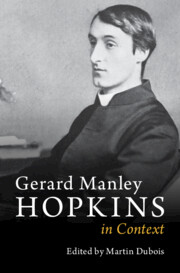Book contents
- Gerard Manley Hopkins in Context
- Gerard Manley Hopkins in Context
- Copyright page
- Contents
- Illustrations
- Notes on Contributors
- Note on Editions and Abbreviations
- Chronology
- Introduction
- Part I Places
- Part II Aesthetic and Cultural Contexts
- Part III Religious, Theological, and Philosophical Contexts
- Part IV Nature, Science, and the Environment
- Part V Gender, Sexuality, and the Body
- Chapter 21 Queerness and Homosociality
- Chapter 22 Masculinity and the Labouring Body
- Chapter 23 Femininity and Martyrdom
- Chapter 24 Eroticism
- Part VI Form, Genre, and Poetics
- Part VII Reception and Influence
- Further Reading
- Index
Chapter 24 - Eroticism
from Part V - Gender, Sexuality, and the Body
Published online by Cambridge University Press: 16 January 2025
- Gerard Manley Hopkins in Context
- Gerard Manley Hopkins in Context
- Copyright page
- Contents
- Illustrations
- Notes on Contributors
- Note on Editions and Abbreviations
- Chronology
- Introduction
- Part I Places
- Part II Aesthetic and Cultural Contexts
- Part III Religious, Theological, and Philosophical Contexts
- Part IV Nature, Science, and the Environment
- Part V Gender, Sexuality, and the Body
- Chapter 21 Queerness and Homosociality
- Chapter 22 Masculinity and the Labouring Body
- Chapter 23 Femininity and Martyrdom
- Chapter 24 Eroticism
- Part VI Form, Genre, and Poetics
- Part VII Reception and Influence
- Further Reading
- Index
Summary
In Hopkins’s writing, eroticism centres on eros or amor and loving the body of Christ. In the framework of Hopkins’s spiritual eroticism, eros or amor is love. Understanding the significance of love and the body in Hopkins’s writings – his poems, sermons, spiritual writings, diaries, essays, and letters – allows us to come to a fuller understanding of his relationship with Christ. Hopkins’s vow of celibacy afforded him the freedom to express his passion for Christ through romantic and sexual tropes such as touching hands, melting and merging subjects, beating hearts, magnetic attraction, mutual gazes, kisses, embraces, fecundity, and homecoming. We shall look at some of these tropes in this chapter, many of which can be traced back to ancient Greece and the early church fathers. Ultimately, Hopkins wrote about erotic desires and tactile pleasures in a manner that was broad and expansive.
- Type
- Chapter
- Information
- Gerard Manley Hopkins in Context , pp. 210 - 216Publisher: Cambridge University PressPrint publication year: 2025

